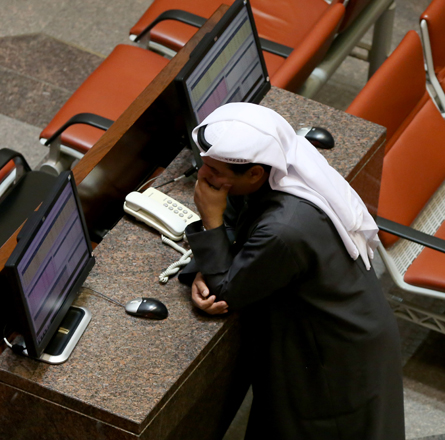KUWAIT CITY — Share prices in the energy-rich Gulf states nosedived Sunday following the sharp decline in oil prices as Iran prepares to resume crude exports after the lifting of sanctions.
The plunge in the first day of trading in the Muslim week also follows heavy losses in global bourses on Friday, when Gulf exchanges were closed for the weekend.
The price of oil, which contributes more than 80 per cent to Gulf states' revenues, shed more than 20 per cent this year to drop below $30 a barrel. This follows a plunge of 65 per cent in the past two years.
The expected return of Iran to the oil market, following the implementation Saturday of its historic nuclear deal with world powers, will only worsen the production glut that has been the main reason for the oil price dive.
All seven Gulf bourses saw a wave of panick selling, sending indices to multi-year lows.
Big investors joined small dealers in dumping shares in fear of a further slump.
"The majority of Gulf firms depend on their governments, which depend on oil revenues. No one knows the bottom of oil prices," Kuwaiti analyst Ali Al Nemish said.
"The Iranian impact on the markets appears to be somewhat inflated because Iranian crude exports will not be huge initially," Nemish added.
Negative territory
The bourses of Saudi Arabia, Qatar and Abu Dhabi have already lost in the past two weeks more than they dropped in the whole of 2015.
The Saudi Tadawul All-Shares Index, the largest Arab market, fell by over 7.2 during trading but recovered slightly to finish down 5.44 per cent on 5,520.41 points, close to a five-year low.
The leading petrochemicals sector dipped 5.1 per cent, while banks lost 3.7 per cent.
Since the start of 2016, the TASI has dropped 20.1 per cent, more than all of its losses last year.
The Qatar Exchange, the second largest in the Gulf after Saudi Arabia's, plunged 7.2 per cent to close trading just above the 8,500-point mark, last seen in April 2013.
All the listed firms were in the red and the bourse has so far dipped 18 per cent this year, more than the 15 per cent it lost in 2015.
The Dubai Financial Market dropped 6 per cent at the opening but recovered slightly to close the day down 4.64 per cent on 2,684.9 points, a three-year low.
Blue-chip properties giant Emaar shed 4 per cent and the leading construction firm Arabtec sank the maximum allowed 10 per cent.
Since the beginning of this year, Dubai has dropped 15 per cent.
The Abu Dhabi Securities Exchange also slumped 4.24 per cent but remained above the 3,700-point mark. All sectors were down with banks and real estate shedding above 5 per cent.
Dubai and Abu Dhabi bourses are the lowest since September 2013.
The Kuwait Stock Exchange dropped 3.2 per cent to just above the 5,000-point mark, levels only seen in May 2004.
The small market of Oman dropped 3.2 per cent to below the 5,000-point mark for the first time since mid-2009. Bahrain dropped 0.4 per cent.
Since the beginning of 2016, the seven stock markets have shed more than $130 billion of their market capitalisation, which now stands at about $800 billion.
All Gulf stock exchanges ended 2015 in negative territory, led by Saudi Arabia, after the sharp decline in oil prices.
